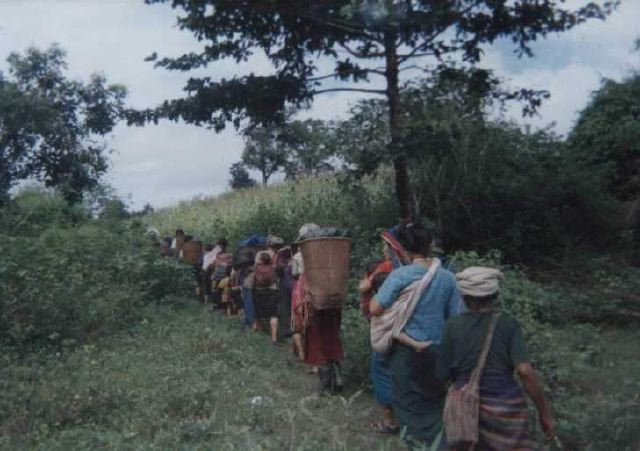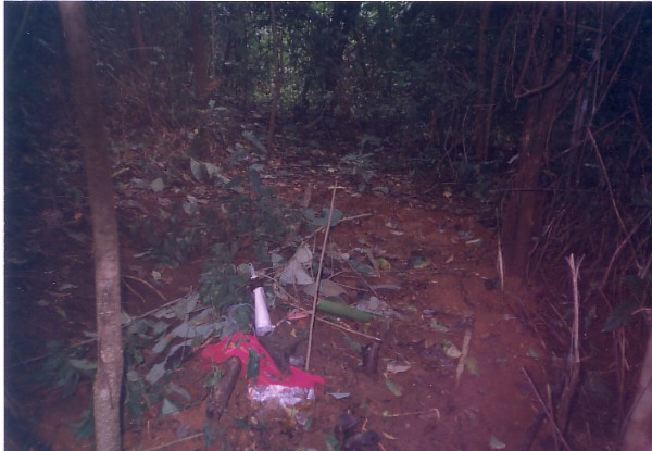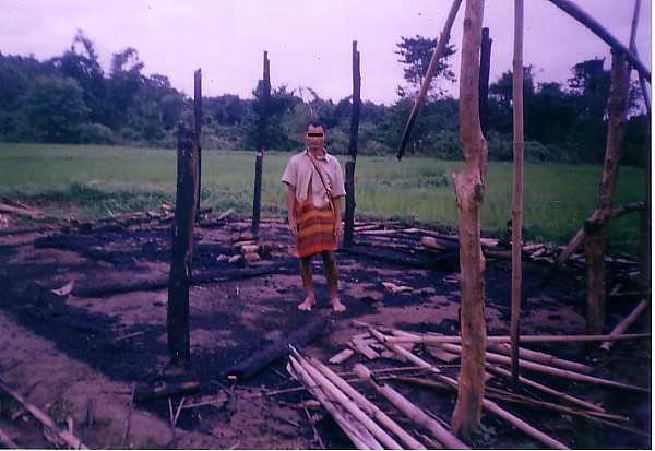FREE
BURMA RANGERS
HUMANITARIAN RELIEF MISSIONS
June – September, 2003
* Note: Additional information about the missions is available upon request.
NORTHERN KAREN STATE-
PAAN DISTRICT
September 2003

IDPs fleeing to the Thai-Burma border
From
the beginning of September through to the 16th, due to fighting between
KNLA (Karen National Liberation Army) troops and combined troops from the SPDC
(State Peace and Development Council or Burma Army) and DKBA (Democratic Karen
Buddhist Army), about 152 people (children to adult) from 37 households became
war victims and fled to the Thai-Burma border to take refuge.
They
were from villages such as Thi Wah Pu, Wa Klu Pu, Po Thwee Mu and Htee Ka Par,
located in Thi Wah Pu Village Tract in Ta Nay Chah Township of Paan District.
As a result of meetings between KNU (Karen National Union) leaders and Thai
local authorities on September 16th and 18th, these villagers were settled at
a Buddhist temple compound in Klen Mu Kyauk village in Tha Song Yang Township
of Tak Province. Most of the war victims are women (mothers) and children. Relief
teams are now in the area that was attacked, to assist the IDPs who have not
fled to the Thai border.
NORTHERN KAREN STATE-PAAN DISTRICT
June-August 2003
A Free Burma Ranger team went on a relief mission from June until August 2003. The members of the team are from Paan District and they traveled in their home area to help those who have recently been attacked by Burma Army and Democratic Karen Buddhist Army (DKBA) troops.
17-year-old Naw Mu Kut's grave.
On August 6, 2003,
a seventeen year old girl from Htee Kli Tha Village was raped and killed by
DKBA soldier Moe Kyo. Her father was arrested and taken into custody, her
family's farm house was burned down and all their animals were killed.
On June 10, 2003, this Htee Th'blu Hta farm house was burned down by Burma Army and DKBA troops.
In this area during
the months of June, July and August, combined Burma Army (LIB 703) and DKBA
(555) troops burned down Si Pa Day Kii village, K'nen Lay Kaw Htit farm
houses, Hsi Pa Day Kee village and farm houses, Htee Th'Blu Hta village and
farm houses. The area has become a free-fire zone, with Burma Army (BA) and
DKBA troops shooting anyone they see who is not staying in areas they have
designated. The BA has restricted the movement of villagers, cutting
off access to the villagers' fields and thus their livelihood. The combined
BA and DKBA troops have looted villagers belongings and forced the villagers'
to work as slaves for them. The report names over 20 villagers who were tortured
or beaten by the BA and DKBA troops, and Naw Mu Kut, who was raped and killed
by a DKBA soldier.
NORTHERN KAREN STATE- MUTHRAW DISTRICT
August 15-30, 2003
The
Muthraw FBR team conducted a mission and visited villagers, particularly in
Lu Thaw Township and border areas of Muthraw District. It was found that the
villagers living in the areas here are facing many difficulties. The worst
situations for them are the brutal military offensives practiced by the Burma
Army. When we met with them we talked about their sufferings and we encouraged
them and prayed for their lives and survival.
The
troops of KnSO (Karenni Solidarity Organization), a group that surrendered
to the SPDC recently, joined with SPDC troops and launched a offensive along
the border area of Muthraw District, Karen State, and the southern Karenni
State. They have also attacked the hiding places of IDPs, forcing some to
flee to Muthraw district. The commanders of the KnSO are Bo Tet Net, Ker Per
Wah and Kyaw Nee Doh. They combined with SPDC troops, stationed in the Maw
Kyi area. The IDPs in the border area are facing difficulties such as food
shortages, clothing shortages, and disease. With fear and in a difficult situation,
all they can do is struggle to survive.
At
all of the IDP locations we visited, we distributed bibles, hymnbooks
and provided medical treatment. We also provided health education in order
for the IDPs to be able to care for their health and to prevent disease.
The team treated a total of 663 patients. The most common ailments were malaria,
anemia, and acute respiratory infections.
It
was found that all of the IDPs in the area are living in constant fear, and
continually move from place to place, desiring to be free from the Burma Army's
oppression. The main necessities for them are food, clothing, health care,
and good security. In some areas the villagers have tried their best and set
up primary schools as the situation permits.

